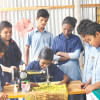Technical, Vocational Education: 73pc graduates earn less than Tk 10k per month

About 73 percent of technical graduates earn less than Tk 10,000 per month, as most job opportunities offer poor salaries due to a lack of skills and a mismatch between supply and demand, as per a study by Centre for Policy Dialogue (CPD).
Of the graduates, 36 percent get Tk 15,000 to Tk 25,000, while only one percent get above Tk 30,000.
CPD yesterday unveiled the findings at an event on government technical and vocational education in the capital's Farmgate.
The survey was conducted on 600 incumbent and former technical students in three districts -- Panchagarh, Satkhira, and Sunamganj -- in collaboration with Citizens Platform for SDGs, Bangladesh, and the Eco-Social Development Organisation (ESDO).
Presenting the keynote, Towfiqul Islam Khan, a senior research fellow at the CPD, said initially certified students have to work without pay as their acquired skills do not properly meet the market demand.
Recruiters often express concern about the graduates' quality of work, he said.

He also said the course curriculums often do not meet the needs of local industries, making it challenging for Technical and Vocational Education and Training (TVET) graduates to find appropriate job opportunities.
According to CPD, only 13 percent of participants believe the quality of education meets their expectations, while 59 percent feel it is satisfactory.
About 87 percent of current and past students believe technical education falls short of their expectations, while 67 percent believe infrastructure is on average level, said the study.
Debapriya Bhattacharya, distinguished fellow at CPD, called for a partnership-based expert committee to modernise technical education.
"I hope the interim government will establish a committee to draft an action plan to create a modern, efficient technical and vocational education system," he said.
He suggested that the government take three months for assessment and four months to implement this transformation by ensuring necessary funding and guidelines in the 2025–26 budget.
Prof Mustafizur Rahman, another CPD distinguished fellow, questioned the effectiveness of new investments in technical education unless existing institutional issues are addressed.
"The employment landscape will change significantly in the next 15 years. We need to prepare the curriculum, trainers, and infrastructure accordingly," he said, adding that foundational technical education initiatives should start at the primary level.
"Our resources are limited, but the demand is substantial. It's essential to allocate resources strategically to make the most impact," he said.
He also stressed the need for good governance, accountability, and transparency.
Md Maksudur Rahman, director (PIU) of the Directorate of Technical Education, admitted that only 18 percent of teaching positions in the technical education sector are filled.
"We are working to fill these vacancies through PSC and other means and hope to resolve this issue soon," he said.
A Matin Chowdhury, former president of UCEP Bangladesh and Bangladesh Textile Mills Association, stressed that training should lead to employment. "Training is incomplete without ensuring job placements," he added.
Md Ruhul Amin, secretary of the Ministry of Expatriates' Welfare and Overseas Employment, said migration costs are rising due to middlemen.
He said a policy is underway to bring these intermediaries under legal regulation, with a platform launching in December to provide transparent information on overseas employment opportunities.
The event was also attended by Md Rakib Ullah, chairman of Bangladesh Technical Education Board, and Rubina Hossain, president of Bangladesh Federation of Women Entrepreneurs, among others.

 For all latest news, follow The Daily Star's Google News channel.
For all latest news, follow The Daily Star's Google News channel. 







Comments